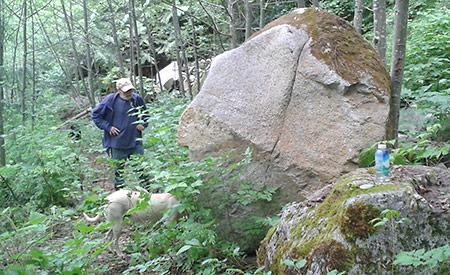Powell River residents have been working on an individual level to keep and maintain backcountry access.
“It’s very spontaneous,” said George Ferreira, a regular participant. Individuals or small groups work to clear, create and maintain roads and trails, he explained. Work is informal, often not even pre-arranged. Someone may work on a partially cleared trail not knowing who has done the work before them.
One of Ferreira’s latest projects was helping to clear a road on D-branch that had been blocked by a landslide about four years ago.
After Ferreira and a friend made their way to the slide, they found that a large log that made up most of the blockage had already been pulled aside by previous workers.
The pair cleared up the remaining debris to the point where they could drive their truck past the slide site. Upon making it to the overgrown road beyond, they came across an impassable boulder taller than the average man. Stuck, they drove back home.
Ferreira returned to the road a couple weeks later to find that the boulder had been dragged up the hill by Shawn Hegan, another spontaneous participant in the project.
Hegan and his hiking partner, Frank Schlogl, had rented some equipment to move the boulder out of the way. “It’s still a little overgrown, but it’s definitely passable,” Hegan explained. “We’re just extremely happy to have access to that area back.”
The road provides access to the north end to the South Powell Divide and allows people to hike to a trail of alpine lakes.
“These hiking trails are on official maps, but at the same time, they’ve been blocked from public access,” said Hegan of the roads individuals work to maintain. “It’s up to the users to make it happen.”
Participants are hikers, skiers, rock climbers, ATVers and mountaineers. They work together, in a loose, organic sense. “It’s really a grassroots effort,” said Hegan.
Another one of these grassroots workers is John Rapp, an avid skier and mountaineer. He has both built his own trails and worked to keep others open.
“You have this great network of logging roads that get you so close that you’re almost there, but not quite,” he explained. “Usually, you end up bush whacking or building a trail. If it’s a good route, maybe you go back and build a better trail.”
Rapp said trying to keep trails open is a constant battle. Trail building, he explained, happens in cycles. Logging companies come in and refurbish a derelict road. After using it to log for a period of time, they deactivate the road, sometimes deconstructing it.
“They leave a little bit of road there, just enough that it’s easier to use what they’ve left,” said Rapp. “Then we, the general public, go in and fix it up.”
Fixing up can involve rounding out deep ditches by hand and even building bridges. Sometimes, when the road is unsalvageable, it’s made into a walking trail.
In terms of trail building, the main challenge comes from the abundant and quick-growing alder trees. “When the alder comes up, you prune it and try to make a canopy that covers the trail,” Rapp explained. “Then you’re left with something underneath that will self-maintain.”
Trail building comes a far second to maintenance though. “It’s a lot of work, just to maintain what we have,” he said. “It’s mostly about keeping the old stuff open.”
According to Rapp, the list of recent maintenance runs long. Some locations are K-branch, Goat 1 and Goat 2, which caused an uproar in 2010 when it was left with deep ditches after being deactivated by Plutonic Power Corporation.
The roads off Stillwater Main are also popular maintenance spots due to their quick accessibility. F-branch, A-branch, E-branch, J-branch, and R-branch have been worked on recently.
Besides the individual warriors, organized groups also play a large part in backcountry access and maintenance. The Knucklehead’s Winter Recreation Association, Climbers’ Access Society of BC, Backcountry Horsemen, Powell River ATV Club and Powell River Parks and Wilderness Society have all helped improve accessibility.
Ferreira put it succinctly. “This is our backyard,” he said, “and we should be allowed to play in it.”



